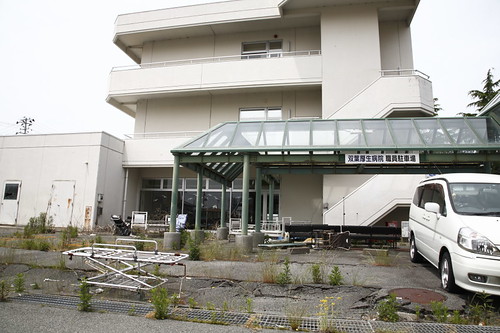Journalist Ryuichi Kino's photographs of the ex-evacuation zone triggered my memory of what the former mayor of Futaba-machi had said about the fateful day.
Mayor Katsutaka Idogawa's recollection of March 12, 2011, as compiled by journalist Hiromichi Ugaya who attended Idogawa's press conference in February 2012 (from my post on that day):
We weren't told of the "vent" [of Reactor 1] that the government decided to do. The vent was carried out while the residents were still in town. I wonder if they [the government] think of us as Japanese citizens. This is like pre-Meiji Restoration [when there was no notion of citizens of a nation].
On March 12, as the residents were fleeing, I was in front of Futaba Kosei Hospital guiding the hospital patients and elderly people from the nearby senior citizens' home to a bus [for evacuation] when the first hydrogen explosion took place. There was a dull "thud".
"Oh no, it finally happened," the mayor thought. After a few minutes, small debris that looked like glass fiber insulation materials came falling down from the sky like large snowflakes. "Big ones were this big", the mayor puts his thumb and index finger together to form a circle.
Futaba Kosei Hospital is only 2 kilometers away from Fukushima I Nuclear Power Plant. About 300 people, including municipal workers, doctors and nurses, watched the flakes of insulation materials fall like snow, stunned. The mayor thought, "We're finished."
The mayor looks back and says, "That was a very, very strange sight. It was like a movie". Not knowing what to do, he just dusted off his clothes with his hand.
Futaba Kosei Hospital in June 2013, by Ryuichi Kino. This is where Mayor Idogawa was on March 12, 2011.

For more of Kino's photos from June 2013, see my previous post.
As announced by Fukushima prefectural government in September 2012, in Kamihatori District in Futaba-machi, about 1.5 kilometers west of Futaba Kosei Hospital, the radiation level spiked to 1,590 microsieverts/hour at 3PM on March 12, 2011, BEFORE the hydrogen explosion of Reactor 1 building at 3:36PM.



 Tokyo Time
Tokyo Time
![[Most Recent Quotes from www.kitco.com]](http://www.kitconet.com/charts/metals/gold/t24_au_en_usoz_2.gif)


11 comments:
The government of my country has responded to this situation by raising the amount of radiation exposure allowed to its citizens. The nuclear disease has nothing to do with the radiation exposure one has experienced. It has to do with a determined effort to ignore the dangers of radiation.
Greyhawk,
you are perfectly right: the EU has done the same; in order to reduce damage payments to growers who would not be able to ship contaminated produce, I guess.
Beppe
Greyhawk and Beppe, that means how little food is imported from Japan. Japan's largest export market for agricultural products including fish and meat is Asia.
@4:59
The EU has quietly raised radionuclide limits for food across the board one or two years ago; this has nothing to do with where Japan exports food. It is however related to how much damages that European utilities should pay to European growers in case, say, a French npp had a major accident.
BTW, estimates of the costs of a large nuclear accident in France are at 5 billion USD, if I recall correctly.
Beppe
Sorry, that was 580 billion (http://www.reuters.com/article/2013/02/07/us-france-nuclear-disaster-cost-idUSBRE91603X20130207)
@4:59
One more thing, we often hear the following (flawed) reasoning: "Food X tends to be heavily contaminated however since [on average] it is not eaten in large quantities higher contamination is acceptable".
There are two problems with this reasoning. The first is in the implicit "on average": what if I eat X more than average?
The second problem is that you only hear this reasoning for nuclear contamination. What if someone said "Swordfish has a lot of mercury in it but since on average people do not eat a lot of swordfish it is OK"? Obviously most people would realize this is nonsense and they would be right, both for mercury and for cesium and strontium.
Beppe, contamination levels that countries adopt are based on Codex Alimentarius, which is based on amount of food imported from the contaminated region. Higher numbers inversely corresponds to the amount of food imports from the contaminated region.
A few thoughts :
after Tchernobyl Soviet and European governments had no other solution than to raise the "acceptable" levels that had become a kind on "background radiation"
Beppe, the EU parliament is contaminated and turning weird now.
There was a time unfair matters in a country could be opposed to by the EU, it seems over now.
Yes about France's economy exposure to a severe nuclear accident, I commented on this here already. Only Corine Lepage , former minister of environment, center-right , had enough courrage to speak it out.
Phiphi
If this is true it is obviously nonsense. If it is nonsense it probably comes from the nuclear lobby.
Yeah, the whole world seems to be dumping even the watered down democracy it had. It must be the financial crisis. 1929, welcome back.
OT: Fukushima fishermen went out in the sea nearby Fuku 1 for "test fishing". They sent out 20 ships (20?? for testing??).
The fish they caught was quickly checked for cesium, some (?) was found to be below legal limits and hence shipped to the markets inside and outside Fukushima (Asahi tv, Jiji)
In a similar fashion rice harvesting in locations close to the plant has resumed too. Talks about the npp restarts have resumed too.
Leaks at Fuku 1 must have suddenly stopped because they are not on the news any more.
Beppe
Post a Comment